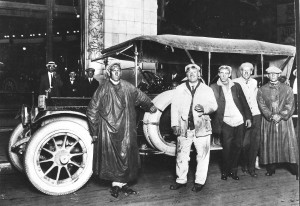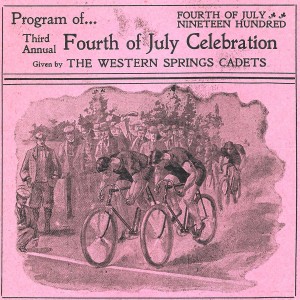Local resident E.C. Patterson once set a record driving from Chicago to New York in just 35 hours. But, did you know that he also organized local boys into the Western Springs Cadets?

E.C. Patterson (left) with his Packard automobile
E.C. Patterson was, by any measure, a colorful character. While he held key management positions in several companies over the years, he was equally interested in automobiles and athletic competition.
His interest in developing our local youth was most evident in 1898 when he organized a military-type club for youngsters, the Western Springs Cadets, complete with uniforms.
In 1898, the Cadets were treated to a formal banquet at the home of “Captain” Patterson. These events became a regular occurrence. In fact, several printed menus appear in the historical society’s archives from that point onward.

Menu from 1898 Cadet Banquet
Also in 1898, the Cadets began sponsoring an annual Fourth of July Celebration. The program included a Field Day consisting of such activities as a 100-yard-dash, sack races, a half-mile bicycle race, a three-legged race, a three-mile bicycle race, a tug of war, a greased pole climb, and a five-inning baseball game, which was then a brand new activity in town.
The program advised, “If you can’t find the place, listen for the Band, which will furnish suitable music whenever they feel like it.” And, at 6:30 p.m., the Cadets presented an “exhibition uniform drill”. The program also advised that “Ice cream and lemonade will be served at all events”.
The annual Fourth of July activities appear to have been the Cadets’ primary activity. However, in 1901, they produced a Minstrel Show which, by today’s standards, would be considered politically incorrect.

Program from 1900 Fourth of July Celebration
In a 1928 newspaper interview, some former cadets recalled the organization with both fondness and disdain. “We marched and counter-marched until our feet were hot, and the maple flooring of the old Grand Avenue school hall groaned with disgust.” Another recalled that they carried wooden guns and “looked fierce.” Occasionally, the cadets gave a drill for “admiring parents and sisters.” Uniforms were described as “tight little tunics like the bellhops wear in fashionable hotels.”
Sadly, there are no known photographs of the cadets and it appears that the group was short-lived. But, at least one former cadet recalled the value of his “prior training” when, years later, he reported for duty at the U.S. Army artillery school.
